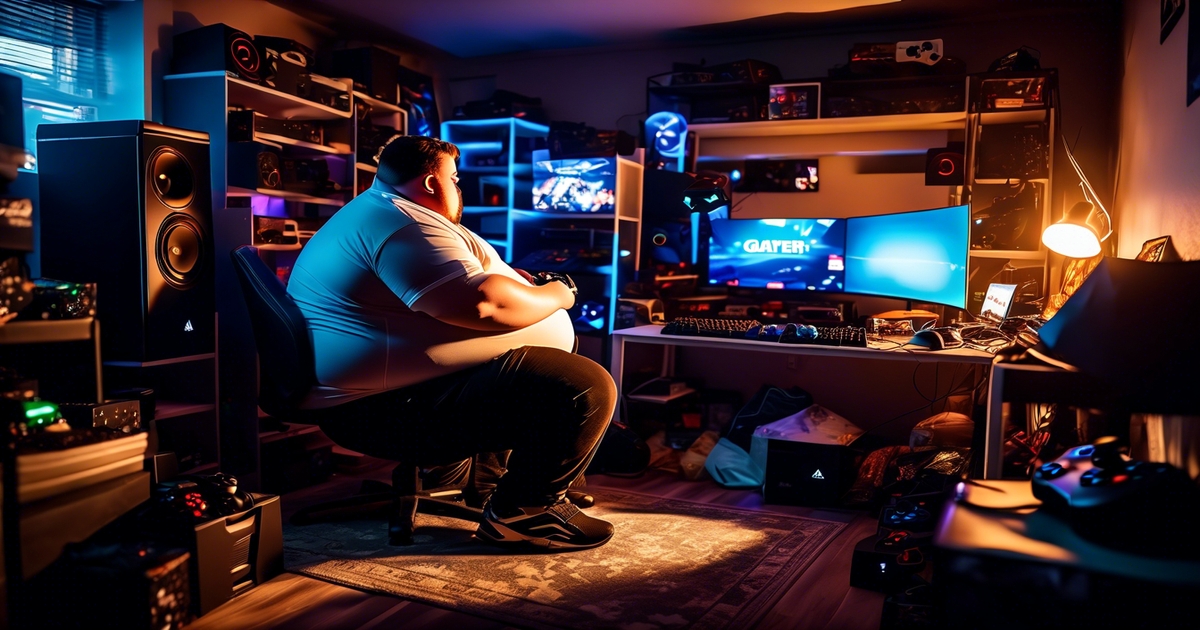Are Video Games a Waste of Time?

Did you know that the majority of American households have at least one gaming console? With video games becoming a prevalent form of entertainment, many have voiced out that playing videos games is a complete waste of time.
The controversy surrounding the value of video games is multifaceted. On one hand, they offer an immersive way to escape reality and even aid in problem-solving and character development. Conversely, concerns about excessive screen time, violent content, and their potential to limit social interaction are raised.
In this article, we’ll go over answering the question of whether playing video games is a waste of time… or a productive use of time.
Understanding The Motivation Behind Gaming: Why Do Gamers Game?
Psychological Motivation
People of all ages play video games for various reasons. One of the motivations behind gaming is the psychological aspect. Video games provide a sense of achievement and progress, which can be highly rewarding. For example, when players level up or accomplish challenging tasks within a game, it triggers feelings of accomplishment and success. This can positively impact their self-esteem and motivation in real life.
Gaming offers an escape from reality by allowing individuals to immerse themselves in different worlds and stories. This escapism can serve as a form of stress relief or relaxation for many players. It’s similar to reading a captivating book or watching an engaging movie; video games offer an interactive way to experience compelling narratives while actively participating in the storyline.

Emotional Motivation
Another significant reason why people are drawn to playing video games is emotional fulfillment. Games often evoke strong emotions such as excitement, joy, and even fear or suspense depending on the genre being played. For instance, action-packed games may trigger adrenaline rushes during intense combat sequences, providing a thrilling experience for players.
Moreover, multiplayer games enable social interaction among gamers worldwide through online platforms. These interactions foster friendships and communities within the gaming world that contribute to emotional well-being by combating loneliness and promoting camaraderie.
Are Video Games a Waste of Time?
So, are playing games a huge waste of time? Should gamers quit playing games and do something more useful with their time?
Pros and Cons of Video Game Usage
Playing video games can be a fun way to unwind after a long day. Many people enjoy immersing themselves in different virtual worlds, solving puzzles, or competing with friends. It’s a popular form of entertainment and a beloved hobby for millions around the world.
However, excessive gaming can lead to absurd play times, where individuals spend countless hours in front of their screens. This may take away from engaging in real-life activities such as exercising, socializing with friends and family, or pursuing personal hobbies and interests outside the digital realm.
On one hand, gaming offers an escape from reality and provides an avenue for relaxation. On the other hand, spending too much time on video games might hinder personal growth and development by neglecting crucial aspects of life beyond the screen.
- Pro: Provides entertainment and relaxation
- Pro: Offers immersive experiences in various virtual worlds
- Con: Can lead to excessive play times at the expense of real-life activities
- Con: May hinder personal growth if not balanced with other pursuits
Striking a Balance Between Gaming and Real Life
Finding balance is key. While enjoying gaming is perfectly fine, it’s essential to ensure that it doesn’t overshadow important responsibilities or opportunities for personal growth.
For instance; setting specific time limits for gaming each day can help prevent excessive playtimes while still allowing individuals to indulge in their favorite pastime. Additionally; incorporating physical activities into daily routines alongside gaming sessions promotes overall well-being by counteracting sedentary behavior associated with prolonged screen time.
The Trade-Offs of Spending Time on Video Games
Examining Potential Trade-Offs
Spending much time playing video games can lead to a trade-off in other areas of life. While gaming can be entertaining and even educational, it’s essential to consider the potential consequences of dedicating excessive time to this activity. For instance, individuals who invest absurd play times into video games may find themselves sacrificing opportunities for physical exercise, social interactions, or pursuing other hobbies. This trade-off could impact their overall well-being and personal development.
When individuals prioritize gaming over engaging in real-life experiences, they might miss out on valuable moments with friends and family or neglect responsibilities such as schoolwork or chores. As a result, the negative effects of spending an excessive amount of time on video games may manifest in various aspects of their lives. It’s crucial to recognize that while gaming offers entertainment and cognitive stimulation, it also carries opportunity costs that should not be overlooked.
Impact on Other Areas
The waste of countless hours engrossed in video games can have repercussions beyond just missed opportunities for personal growth. For example, students who allocate substantial chunks of time to gaming might experience declining academic performance due to neglected study sessions or incomplete assignments. Individuals immersed in prolonged gaming sessions might struggle with disrupted sleep patterns or neglecting self-care routines such as proper nutrition and hygiene.
Furthermore, when considering whether video games are a waste of time, one must contemplate the balance between leisure activities and productive endeavors. While some leisure activities like reading books or watching movies offer relaxation without demanding excessive amounts of time, indulging excessively in video games poses unique challenges due to their interactive nature and potential addictive qualities.
- Pros: Gaming provides entertainment and cognitive stimulation.
- Cons: Excessive gaming leads to missed real-life experiences and neglected responsibilities.
Are Video Games a Productive Use of Time?
Contrary to popular belief, video games can be a productive use of time. Let’s explore some reasons why.
Productivity and Educational Value
Many people wonder, “Are video games a waste of time?” Well, some video game usage can actually be productive. Certain video games are designed to enhance problem-solving skills, critical thinking, and strategic planning. For example, puzzle games like Tetris or educational games like Math Blaster can help improve cognitive abilities in players.
Furthermore, there are simulation games that provide valuable insights into real-world scenarios. Games such as SimCity or Civilization encourage players to manage resources effectively and make decisions that impact the virtual environment they control. These experiences can translate into practical knowledge applicable in various aspects of life.
On the other hand, many modern video games incorporate historical events and scientific concepts into their narratives. This not only educates players but also fosters an interest in learning about different subjects outside the gaming world.
In addition to educational value, certain video game activities involve teamwork and collaboration among players. Multiplayer online games often require coordination with teammates to achieve common objectives. This cultivates social skills such as communication, leadership, and cooperation while fostering a sense of community within the gaming environment.

Differing Perspectives
It’s important to acknowledge that differing perspectives exist regarding the productivity of engaging in video game usage activities. While some view it as a form of leisure or entertainment with little tangible benefit beyond enjoyment, others recognize its potential for personal growth and skill development.
Critics argue that excessive time spent playing video games may lead to neglecting responsibilities or missing out on real-life experiences. However, proponents highlight how certain gaming experiences contribute positively by stimulating creativity through storytelling elements or providing an outlet for stress relief after a long day.
Moreover, research has shown positive correlations between playing certain types of video games and improved hand-eye coordination as well as enhanced spatial awareness—skills beneficial not only within the gaming realm but also applicable in professional fields such as surgery or engineering.
The Impact of Video Games on Adult Life
Influence on Responsibilities
Video games can significantly impact adult responsibilities and obligations. While gaming can be a source of entertainment, excessive playtime might lead to neglecting important duties in real life. For instance, an individual engrossed in gaming may overlook household chores or procrastinate work-related tasks.
Moreover, the addictive nature of video games could potentially affect an adult’s ability to manage their time efficiently.This might result in missed deadlines at work or even hinder progress towards personal goals. As a result, individuals may find it challenging to balance their gaming habits with their responsibilities as adults.
Effects on Well-being and Relationships
The influence of gaming on career, relationships, and personal well-being is substantial. Excessive gameplay can negatively impact an individual’s physical health due to prolonged periods of sitting and lack of physical activity. The immersive nature of video games could lead to increased stress levels if the player becomes too emotionally invested in the game’s outcomes.
In terms of relationships, spending excessive time playing video games might strain interpersonal connections with family members and friends. It could lead to feelings of neglect among loved ones if an individual prioritizes gaming over spending quality time with them. This shift in focus has the potential to create rifts within relationships and contribute to feelings of isolation for both parties involved.
Impact from Various Angles
When considering the impact of video games on adult life from various angles, it is essential to recognize that while gaming offers opportunities for relaxation and social interaction through online multiplayer experiences, its negative effects cannot be overlooked. The allure of virtual worlds might sometimes overshadow real-world responsibilities and commitments.
Furthermore, young people who are transitioning into adulthood may face challenges when trying to establish themselves professionally while struggling with excessive gaming habits that consume valuable time better spent pursuing educational or career-oriented endeavors.
Balancing Adult Life and Video Game Engagement
Strategies for Balance
Finding a balanced life between adult responsibilities and gaming interests is crucial. One strategy is to set specific time limits for gaming, ensuring that it doesn’t interfere with work, family, or other obligations. For example, allocating an hour or two in the evening for gaming can help maintain a healthy balance. Another approach involves prioritizing tasks and completing them before indulging in gaming activities.
Integrating gaming into adult life without compromising other important commitments requires careful planning. Adults can schedule game time during periods of relaxation or leisure, such as weekends or evenings after work. It’s essential to communicate with family members about designated game times to ensure mutual understanding and support.
Challenges and Solutions
One common challenge related to balancing gaming with adult responsibilities is the perceived double standard between adults and teens. While adults may feel guilty about spending time on games instead of more “mature” activities, it’s important to recognize that everyone deserves leisure time regardless of age.
Another challenge revolves around finding the right level of control when engaging in video games while fulfilling adult duties. This can be addressed by setting clear boundaries and adhering to predefined schedules for gaming sessions. Seeking support from friends or family members can provide accountability and help maintain a healthy balance.
Reevaluating Personal Values in Relation to Gaming
Reflecting on Priorities
It’s essential for individuals to take a moment and reflect on their personal values and priorities. Understanding how hobbies like gaming fit into one’s life can help in making informed decisions about the time spent engaging in them. For example, if a person values learning new skills, they might choose games that offer educational content or require problem-solving abilities.
Considering the impact of gaming on personal time and evaluating its significance within one’s life can lead to a more mindful approach. By aligning gaming habits with individual values, individuals can ensure that their leisure activities contribute positively to their overall well-being.
Aligning Gaming Habits with Goals
It is crucial for individuals to recognize how their gaming habits align with their long-term goals and aspirations. If a person aspires to develop specific skills or achieve certain milestones, they may choose games that support these objectives. For instance, someone aiming to enhance strategic thinking might opt for strategy-based games rather than solely entertainment-focused ones.
By consciously selecting games that complement personal goals, individuals can transform what some perceive as mere pastime into an opportunity for growth and development. This alignment ensures that the time spent playing video games contributes meaningfully towards achieving desired outcomes.
Influence of Personal Values
The influence of personal values extends beyond justifying the time spent on video games; it also shapes perceptions of whether gaming is a worthwhile pursuit. For example, an individual who highly regards creativity may view game design or modding as valuable creative outlets within the realm of gaming. On the other hand, someone who prioritizes social connection might see multiplayer online games as avenues for building relationships and fostering teamwork skills.
Understanding how personal values influence perceptions of gaming helps individuals appreciate its potential positive impacts aligned with those very values.
Prioritizing Health and Well-being Over Gaming
Potential Health Implications
Excessive playing games can have detrimental effects on both physical and mental health. Prolonged periods of gaming may lead to a sedentary lifestyle, increasing the risk of various health problems such as obesity, musculoskeletal issues, and cardiovascular diseases. Excessive gaming can contribute to poor posture, eye strain, and disrupted sleep patterns. These factors collectively impact an individual’s overall well-being.
When individuals spend extended hours in front of a screen without engaging in other activities like exercising or socializing, it can lead to a lack of physical activity which is crucial for maintaining good health. The mind also needs stimulation from varied activities such as reading books or participating in hobbies like martial arts to stay sharp and healthy.

Maintaining a Healthy Balance
It’s essential for individuals who enjoy playing games to prioritize their well-being by incorporating healthy habits into their daily routine. This includes ensuring they get enough sleep each night, engaging in regular exercise outside of gaming sessions, and making time for social interactions with friends and family. By striking a balance between gaming and other activities such as going to the gym or spending time outdoors, individuals can mitigate the potential negative impacts associated with excessive gaming.
One effective approach is setting specific time limits for playing video games each day while allocating ample time for physical exercise or outdoor activities. For example:
- Allocate 1-2 hours per day for playing video games.
- Dedicate at least 30 minutes every day to engage in exercises that promote movement such as walking or cycling.
- Plan social gatherings with friends at least once or twice a week.
Seeking Support to Overcome Gaming Addiction
Importance of Seeking Help
Struggling with excessive gaming can have a significant impact on individuals’ lives, affecting their mental and physical well-being. It’s crucial to understand that addiction to video games is a real issue that requires professional assistance. Seeking help is not a sign of weakness but rather a proactive step towards regaining control over one’s life.
Reaching out for support can provide individuals with the necessary tools and strategies to manage their gaming habits effectively. Therapists, counselors, or support groups specializing in addiction can offer personalized guidance tailored to address specific gaming-related challenges. For example, cognitive-behavioral therapy (CBT) has been proven effective in treating gaming addiction by helping individuals identify triggers and develop healthier coping mechanisms.
Seeking help also allows individuals struggling with gaming addiction to connect with others facing similar challenges. This sense of community fosters understanding, empathy, and encouragement among peers who share common experiences. It provides an opportunity for individuals to learn from others’ successes and setbacks while receiving non-judgmental support throughout their recovery journey.
Resources and Guidance
Various resources are available for those seeking assistance in overcoming problematic gaming behaviors. Online platforms such as websites dedicated to mental health or addiction offer valuable information about recognizing the signs of gaming addiction and accessing professional help. Furthermore, hotlines staffed by trained professionals are accessible 24/7 for immediate support and guidance.
In addition to seeking professional help, incorporating self-help strategies into daily routines can complement formal treatment efforts. Setting achievable goals related to reducing screen time or participating in alternative activities can aid in gradually shifting focus away from excessive gaming. Moreover, engaging in physical exercise or hobbies outside of the digital realm promotes overall well-being while providing healthy outlets for stress relief.
Benefits of Taking a Break from Gaming
Personal Growth
Taking a break from gaming can lead to personal growth. It provides an opportunity to explore new interests and hobbies, leading to the development of diverse skills. For example, instead of spending hours playing video games, individuals could use that time to learn a musical instrument or engage in physical activities like hiking or swimming. This exploration outside the realm of gaming can result in enhanced creativity and problem-solving abilities.
Engaging in different activities also fosters social interactions. By participating in group sports or joining clubs related to new hobbies, individuals have more opportunities to meet people with similar interests. These interactions contribute positively to one’s personal development by improving communication skills and building self-confidence.
New Experiences
Stepping away from regular gaming routines opens doors to new experiences. Whether it’s traveling, volunteering for community service projects, or simply trying out new cuisines at local restaurants, taking breaks allows individuals to broaden their horizons beyond virtual worlds.
For instance, instead of spending weekends solely immersed in gaming environments, people can plan outdoor excursions with friends or family members. This not only exposes them to different environments but also creates lasting memories and enriching experiences that cannot be replicated within the confines of video games.
Diversifying Leisure Activities
Another significant benefit is diversifying leisure activities beyond gaming pursuits. While video games offer entertainment value and escapism, indulging exclusively in this pastime may lead to burnout over time. By exploring alternative leisure activities such as reading books, practicing mindfulness through meditation or yoga, gardening, cooking new recipes—individuals maintain a healthy balance between various forms of recreation.
Moreover diversification helps prevent monotony and gives the brain an opportunity for rest by engaging in less mentally taxing activities occasionally.
Conclusion on the Value of Video Games
Positive Impact
Video games can actually be a valuable use of time for many individuals. They provide a great deal of fun and entertainment, which is essential for relaxation and stress relief. In fact, studies have shown that playing video games can improve cognitive functions, problem-solving skills, and decision-making abilities. Many games also offer educational value, teaching players about history, science, and even social issues. For example, children who play simulation games like “SimCity” or “Minecraft” often develop a better understanding of city planning and resource management.
Moreover, some video games encourage physical activity through motion-based gaming consoles like the Nintendo Wii or Xbox Kinect. These games not only entertain but also promote physical fitness and coordination. Multiplayer online games foster teamwork and social interaction among players from around the world. They create a sense of community and help individuals build lasting friendships. Therefore, it’s clear that there are many positive aspects to playing video games, especially when they are enjoyed in moderation.
Time Management
While video games can be beneficial, it’s important to acknowledge that excessive gaming can lead to negative consequences. Like any activity, moderation is key. Spending an excessive amount of time on video games may lead to neglecting other important responsibilities or activities such as homework, chores, or physical exercise. It’s essential for individuals to strike a balance between gaming and other aspects of life to ensure overall well-being.
Furthermore, some video games may contain violent or inappropriate content that is not suitable for all age groups. Parents need to monitor the types of games their children are playing and ensure that they are appropriate for their age and maturity level. Setting time limits and establishing guidelines for gaming can help prevent it from becoming a waste of time. By promoting responsible gaming habits, individuals can enjoy the benefits without sacrificing other important aspects of life.
Frequently Asked Questions
Are video games a waste of time?
Video games are not inherently a waste of time. They can provide entertainment, relaxation, and even cognitive benefits. However, excessive gaming without balance can lead to negative impacts on other aspects of life.
What are the trade-offs of spending time on video games?
Spending excessive time on video games may lead to neglecting responsibilities, reduced social interaction, and potential health issues. It’s important to find a balance between gaming and other activities for overall well-being.
Are video games a productive use of time?
While some video games offer educational or skill-building opportunities, not all gaming activities directly contribute to productivity. Moderation is key; choosing games that stimulate creativity or problem-solving can make gaming more productive.
How do I prioritize health and well-being over gaming?
Prioritizing health involves setting limits on gaming time, engaging in physical activity, maintaining social connections, and seeking support if struggling with excessive gameplay. Balancing leisure activities with healthy habits is essential for overall well-being.
What are the benefits of taking a break from gaming?
Taking breaks from gaming allows for mental refreshment, improved focus on other activities or responsibilities, increased physical activity, and better sleep patterns. It also provides an opportunity to reassess one’s relationship with gaming for healthier engagement.
